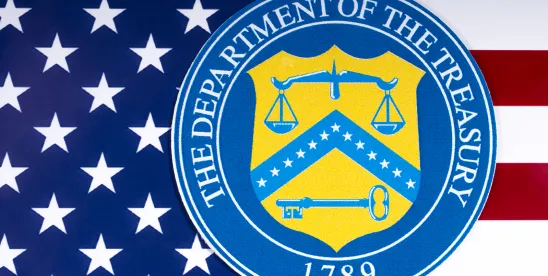On April 16, 2025, the U.S. Department of the Treasury's Office of Foreign Assets Control (OFAC) issued an update to its Sept. 2019 advisory, addressed to the global shipping and maritime sector, regarding sanctions evasion activities in connection with the shipment of Iranian-origin petroleum, petroleum products, and petrochemical products. The update was prompted by the Feb. 4, 2025 National Security Presidential Memorandum (NSPM-2), which directs the U.S. Department of the Treasury to implement a vigorous sanctions program to deny Iran and its terrorist proxies access to revenue.
Previously, on Oct. 11, 2024, Secretary of the Treasury Janet Yellen, in consultation with Secretary of State Anthony Blinken, had designated the petroleum and petrochemical sectors of the Iranian economy pursuant to Executive Order 13902, which authorizes the imposition of sanctions on any designated sector of the Iranian economy.
Iran relies on oil sales revenues to fund its malign activities, including its nuclear weapons and ballistic missile programs, and its support of terrorist groups. The oil shipments create significant sanctions risks for shipping companies, vessel owners, managers, operators, insurers, port operators, port service providers, financial institutions, and others in, or that work with, the maritime industry.
Iran's Deceptive Practices
Iran-linked networks deploy an array of deceptive practices designed to circumvent sanctions, including:
- Use of a "shadow fleet" of tankers. Iranian cargo is often transported on a shadow fleet of tankers, comprised of older, poorly maintained vessels that operate outside of standard maritime regulations. On Dec. 6, 2023, the International Maritime Organization (IMO) issued a resolution urging relevant stakeholders to avoid aiding illegal operations by the shadow fleet, but some stakeholders and jurisdictions continue to do so, by allowing substandard tankers to call at their ports; by overlooking adherence to international maritime regulations such as regular port state control inspections; and by providing bunkering, flagging, and crew management services to tankers sanctioned by OFAC or to other shadow fleet vessels. Iran also uses a separate shadow fleet of gas carriers to transport liquefied petroleum gas, primarily to China.
- Use of ship-to-ship transfers to obscure origin and destination. While ship-to-ship (STS) transfers can be legitimate, Iran often uses multiple such transfers (typically three to five per shipment) to obfuscate the origin of the cargo and/or the involvement of sanctioned vessels. Multiple transfers are a strong risk factor for sanctions evasion. This is especially so when the transfers are conducted at night, in unsafe waters, near sanctioned jurisdictions, terminals, or refineries, or involve a vessel with missing or manipulated Automatic Identification System (AIS) data.
- Use of falsified documents. To obscure the origin and destination of shipments, Iran-linked networks falsify cargo and vessel documents, including bills of lading, certificates of origin, invoices, packing lists, proof of insurance, and lists of last ports of call.
- Disabling or tampering with AIS transponders. To mask their movements, including port calls and STS transfers, vessels transporting Iranian cargo often disable or tamper with their transponders. This is usually done together with other data manipulation, such as falsely reporting the Maritime Mobile Service Identity (MMSI) number or IMO number of the vessel. The updated guidance cautions not to rely solely on a single data point in verifying vessel activity for compliance.
- Use of complex vessel ownership and management structures. Iran-linked networks use multiple shell companies and vessel-owning SPVs in high-risk, low-transparency, and low-regulation jurisdictions. Ship brokers in lax jurisdictions help facilitate transfers between and among shell companies.
- Oil brokering networks. Oil brokers outside Iran help facilitate sales of Iranian petroleum and petroleum products, largely to China, often several steps removed from the initial sale. These oil brokers frequently create or distribute falsified documents, as noted above.
Identifying and Mitigating Sanctions Risks
To safeguard against these practices, and to avoid unwitting violations of sanctions laws, the updated guidance advises maritime sector stakeholders to review their sanctions compliance programs, and to enhance their due diligence and strengthen their internal controls as appropriate. The recommendations include:
- Verify cargo origin. Recipients of cargo should conduct due diligence to corroborate the origin of goods. Red flags include vessels exhibiting deceptive behavior, or suspected links to sanctioned persons or locations. Testing samples of the cargo can reveal chemical signatures unique to Iran's oil fields. Certificates of origin from Oman, the UAE, Iraq, Malaysia, or Singapore should be thoroughly investigated. Shipowners or charterers involved in STS transfers should request documentation regarding vessel STS history or verification of the last time the tank of the offloading vessel was empty, to ensure the cargo is not of Iranian origin.
- Verify insurance. Parties should verify that vessels have adequate and legitimate insurance coverage, and are not relying on sanctioned insurance providers, or on new and untested providers without valid basis.
- Verify flag registration. Vessels registered in jurisdictions known to service shadow fleet vessels, or that have flown multiple flags in a short period of time should be investigated as to ownership, voyage history, and flag history. The IMO's Global Integrated Shipping Information (GISIS) database should be checked, to see if the vessel is flying a "FALSE" or "UNKNOWN" flag.
- Review shipping documentation. Any indication that shipping documentation has been manipulated is a red flag that should be fully investigated. Documents related to STS transfers should establish that the cargo was delivered to the port reflected on the shipping documentation.
- Know your customer (KYC) and know your vessel (KYV). In addition to conducting KYC due diligence (enhanced as appropriate), there should be KYV due diligence conducted on vessels, vessel owners, ultimate beneficial owners and group ultimate owners, and operators involved in contracts, shipments, and related maritime transactions. For vessels, this includes researching the IMO number and vessel history, including travel patterns, available STS history, ownership history, insurance, flag history, ties to evasive activities, actors, or regimes, and assessing risks associated with the owners, operators, or managers.
- Monitor for manipulation of vessel location data. Irregularities in AIS data (including gaps in the data) could indicate manipulation, a serious red flag, warranting enhanced due diligence before further engagement.
- Implement contractual controls. Contracts should contain representations and warranties that counterparties are not engaging in activity that violate, or that would cause a U.S. person to violate, U.S. sanctions laws, and that allow termination when such circumstances arise. In addition, contracts should allow termination based on certain types of suspicious activity.
- Refuse service or port entry to sanctioned vessels. Port agents, operators, and terminals should engage in due diligence to ascertain whether a vessel is sanctioned, and should refuse service or port entry to such vessels.
- Leverage available resources. A fair amount of information is available through open-source databases and from organizations in the maritime sector. These resources should be consulted.
The U.S. government continues to prioritize efforts to curtail Iran's ability to generate revenue from its energy sector. Iran-linked networks have been finding ways to thwart U.S. sanctions. Companies in the maritime sector are particularly at risk of sanctions violations, which - even if inadvertent - potentially carry steep penalties, as the OFAC sanctions program is a "strict liability" regime. Up-to-date sanctions compliance programs are essential. Katten is ready to assist in implementing and upgrading sanctions compliance programs, and guiding clients through these deep and turbulent waters.




 />i
/>i

